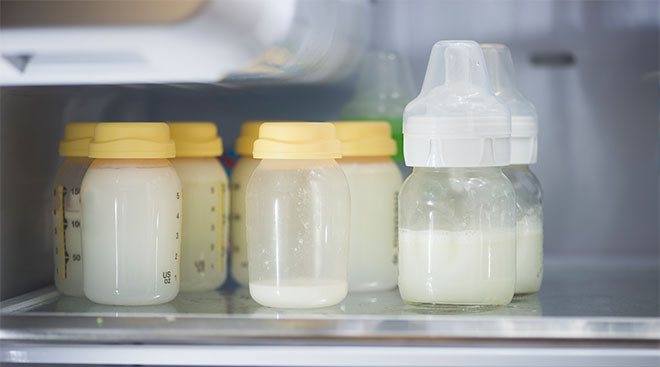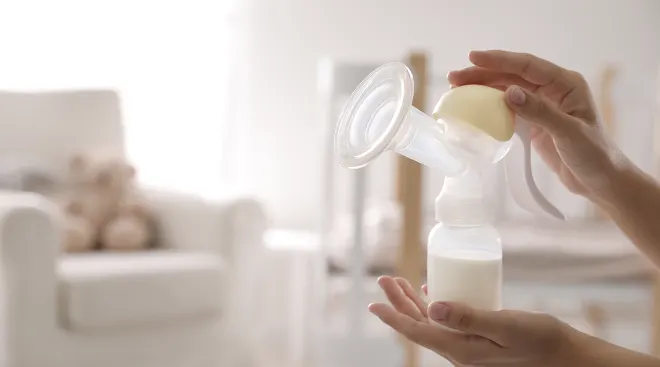Why I've Breastfed, Formula-Fed and Even Considered Donor Milk
Our 8-month-old daughter’s first tooth has started to show itself in her otherwise gummy smile. Of course, I initially noticed it when she began to twist my nipple back and forth and graze that jagged little spike against my skin while nursing. I’d be lying if I said those quick and occasional twinges of pain haven’t made me question whether or not we’ll make it to her first birthday before calling it quits. Our breastfeeding journey had already been pretty complicated. But I know I’ll suck it up and remind myself (again) that I’ve successfully done this twice already. I’ve given myself quite a few quick pep talks over the course of my time breastfeeding three children.
Breastfeeding is a personal decision, and one that I knew I’d always want to make. But it’s not for everyone. As a Black woman, I know that breastfeeding is a choice that doesn’t come quickly or easily for a myriad of reasons. In the United States, Black women have the lowest breastfeeding rates of any other racial group (only about 69 percent of Black moms breastfeed, compared to more than 86 percent of white moms). And many Black moms who do choose to nurse or pump don’t stay the course or stop early on. Furthermore, the over-sexualization of Black women’s breasts leads to stigma around breastfeeding, and this notion makes many Black and Brown moms feel awkward doing something that should be considered beautiful and natural. Breastfeeding advocates and public health workers agree that a much-needed first step to bridging the gap in these disparities is simply encouraging Black moms to breastfeed. But there’s still a lot of work to be done.
Being the oldest of three, I don’t recall ever seeing my mom nurse my younger sister or brother. The youngest of 10, my mom never saw her mom—my grandmother—breastfeeding any of her siblings either. When I inquired about her history with breastfeeding, my mom said that she had only breastfed for the first week or so with each of us because she knew that the early milk (colostrum) was “the good stuff.” Chalking it up to her large breasts and some early latching problems, my mom turned to bottle-feeding us; it seemed more manageable, and we took to formula with ease.
As young parents, fresh out of college and working full-time jobs, my fiancé and I had several conversations about breastfeeding before welcoming our first son. We read parenting books, perused pamphlets at our ob-gyn’s office and educated ourselves about the many proven health benefits of breastfeeding. For starters, it helps boost baby’s immune system from the get-go. Breastfeeding may also help reduce a mama’s risk for developing some aggressive forms of breast and ovarian cancers, type 2 diabetes and high blood pressure, according to the Centers for Disease Control and Prevention (CDC). What’s more, studies have shown that breastfeeding may lower a mom’s risk of experiencing postpartum depression, and that it can also help encourage early bonding.
I was grateful for how enthusiastic my partner was about this form of feeding, and having him cheer me on felt genuinely supportive. (Plus, let’s be honest: We held modest retail management roles, so it was a bonus for us that breastfeeding was essentially free.)
I’ll never forget having the nurse bring our sweet baby boy to my chest for the first time after he was born. She started pinching the bottoms of his feet to get him to open his mouth to latch. I was taken back by her aggressive technique. (Nothing like the provoked tiny tears of your newborn to instantly send you into protective “mama bear” mode.) “You know you could always just give him formula; we have plenty,” she said. I was floored. This moment was about 15 years ago, but I’m still shocked by how the hospital pushed formula on us. We could barely carry all of the canisters they gave us out the door. (We ended up donating the abundant supply to a local day care center.)
Despite that nurse’s lackluster efforts, we eventually found our breastfeeding groove; I nursed him exclusively until his first birthday. It all went pretty smoothly, but there were occasions when I found myself disappointed in society’s less-than-positive reaction to a new breastfeeding mom. One time, I walked into a popular store with my sister and asked to move a chair to a discreet corner to breastfeed. The sales associate gave me the strangest look and said, “I’m sorry, but you can’t do that here.” In retrospect, I can’t even imagine asking someone for permission to feed my child in any establishment. But, of course, this hindsight comes with experience and confidence. Nevertheless, to this day, I’m still angered by the nerve and privilege involved in denying any mom the right to feed her child.
Five years later, we were expecting our second son. This time around, we were planning to supplement with formula. It wasn’t an easy decision to make, but it was one that was medically necessary. I was actively battling flare-ups due to Crohn’s, a chronic autoimmune disease. I was on Prednisone the entire nine months of pregnancy to manage the immense pain. Introducing formula was essential while the baby and I were tapered off of the steroid. I had also been hospitalized so often leading up to this pregnancy, and I didn’t want us to be in a situation where our baby was unfamiliar with formula and hungry.
The best part of breastfeeding and supplementing with formula? My husband loved actively participating in feedings now that we were using bottles. What’s more, I didn’t feel pressured to eat the “perfect diet” this time around. I knew that formula was fortified with the essentials our son needed. It was the right decision for our family, and we continued offering both breast milk and formula for 14 months. The truth is: Our second baby would’ve happily nursed for much longer (he loved the boob!). Weaning took several attempts, but we eventually got there.
We didn’t have much of a feeding “plan” in place during our most recent pregnancy. It had been 10 years since we had welcomed our second baby, and I honestly felt like I was starting from scratch. Due to a sudden onset of preeclampsia and an unexpected induction at 38 weeks, I was given magnesium sulfate intravenously to reduce the risk of seizures. I wish someone had taken the time to explain to me why they’d be introducing our daughter to formula while I continued being medicated and monitored. I was already extremely disappointed that I had barely caught a glimpse of her before she was whisked away to the nursery. Rather than offering comfort, the nurse said, “Well, the baby has to eat.” I knew that she had to eat, but I couldn’t help but feel like my body had failed me. I was so disappointed that I couldn’t nurse my daughter in those first few miraculous hours of life.
Naturally, I wanted to feel like I was a magical, milk-producing goddess. I requested a hospital pump to get out those first drops of colostrum to give our baby girl while she was in the NICU. After 24 hours, during our very first late-night meeting, the nurse handed her to me. Before I could even take in all of her beautiful features, the nurse insisted I start breastfeeding. It felt pushy and intrusive. I politely declined her assistance, and within an hour after some quality skin-to-skin time, our rainbow baby latched on perfectly.
Once we were discharged, I was excited to test out my new wearable wireless breast pump. I couldn’t have cared less that my milk hadn’t actually come in. I was eager to get started! Still, while my Crohn’s disease had been in remission for nearly eight years, my husband and I both agreed that supplementing with formula for nighttime feedings would be wise—just in case, so that she’d be familiar with the taste.
Sadly, the start of our journey as a family of five had a major hiccup. A few days after our baby girl was born—in the midst of a pandemic—I returned to the ER after spiking a fever with dangerously high blood pressure. My husband was unexpectedly left to fend for himself with a teen, a tween, a newborn and two dogs. I had no stash of expressed milk and was concerned for our daughter, who was barely five pounds at the time. Anxiety and fearful thoughts entered my mind, and I tried to get a grip; I knew that stress wouldn’t help early milk production or my blood pressure.
Being re-hospitalized and away from our newborn baby wasn’t something I was mentally prepared for. And since all of my symptoms suggested sepsis and I was on a lot of medications, no one could give me a clear answer about whether or not it was safe to pump milk for her from my hospital bed. Knowing that as a Black patient, I’m my own best advocate, I researched all of the antibiotics I was taking, and decided pumping and dumping was the safest bet. It was all I could do, and I knew it was an important step in maintaining supply. But I couldn’t help feeling defeated as I poured all that hard work down the drain.
Our good friend wanted to help, and generously offered the supply of frozen breast milk she had been storing for her one-year-old baby. Donor milk wasn’t something we had considered before, and we didn’t feel well-versed enough to accept it, but we greatly appreciated the gesture. And I respect any mom who does their due diligence to go down this often shrugged-off path.
Once I was cleared to go home again, things escalated quickly. Life with a newborn, low milk supply and sleepless nights had me completely overwhelmed. Thankfully, my dear friend is a certified lactation specialist, and she helped me learn how to “power pump” to build up my milk supply.
Fast forward to today, and our little ladybug is thriving, happy and healthy, and that’s all we could have ever hoped for. An empowering moment for me this year was when I whipped out my Black breast to nurse our 6-week-old infant in a room full of strangers. Not a single person cringed or told me to cover up. Carefree and confident, I felt an immense sense of pride. During Black Breastfeeding month, I created a series of uplifting affirmation graphics on Instagram in hopes of supporting any new mom that was struggling. I know that the more we share our experiences of Black birth joy and breastfeeding success on social media, the closer we get to normalizing both.
My feeding journey has not been without doubts, twists and obstacles, but it’s been an honor and privilege to nourish my children in various ways. Every circumstance is different, and as mothers all we truly want is what’s best for our babies. Realistically, not everyone can or wants to breastfeed, and that’s fine. It’s a personal and sacred decision. Do what works for you, and seek out the encouragement and support you need. No judgment ever. Fed is best—how you do that is entirely up to you!
About the author:
Danielle Wilson is a lifestyle and entertainment writer and event producer who loves bringing people together through relatable storytelling and impactful, community-focused events. She is passionate about Black maternal health, family wellness and advocating for those with chronic illnesses. She shares snippets of her NYC adventures, raising three Black unicorns with her childhood crush at Dellahsjubilation.com. Follow her on Instagram.
Please note: The Bump and the materials and information it contains are not intended to, and do not constitute, medical or other health advice or diagnosis and should not be used as such. You should always consult with a qualified physician or health professional about your specific circumstances.
Plus, more from The Bump:
Navigate forward to interact with the calendar and select a date. Press the question mark key to get the keyboard shortcuts for changing dates.





















































